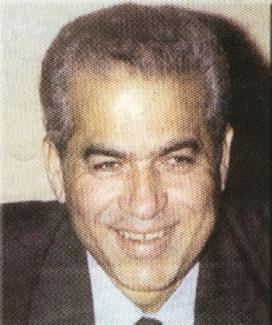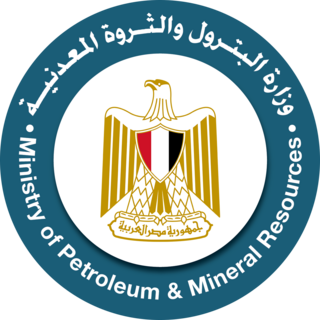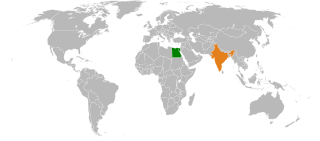Related Research Articles
Atef Muhammad Ebeid was an Egyptian politician who served in various capacities in the governments of Egypt. He was Prime Minister of Egypt from 1999 to 2004.

Kamal Ganzouri was an Egyptian economist who served as the Prime Minister of Egypt from 7 December 2011 to 24 July 2012. He previously served as prime minister from 1996 to 1999. He came to power in 1996 succeeding Atef Sedki, and was in turn succeeded by Atef Ebeid in 1999. He was branded Minister of the Poor and the Opposition Minister because of his way of dealing with limited income people and the opposition. Before becoming prime minister, Ganzouri served as Minister of Planning and International Cooperation. On 24 November 2011, Egypt's military rulers appointed him prime minister. He was sworn in and took office on 7 December 2011.

Mounir Fakhry Abdel Nour is an Egyptian businessman and politician.

Nabil Elaraby is an Egyptian politician and diplomat who was Secretary General of the Arab League from 1 July 2011 to 3 July 2016. Previously, he was Foreign Affairs Minister of Egypt in Essam Sharaf's government from March to June 2011.

The Cabinet of Egypt is the chief executive body of the Arab Republic of Egypt. It consists of the Prime Minister and the cabinet ministers.

The first independent Ministry of Petroleum was established in March 1973, to manage the political role of petroleum resources before the war of 1973. In view of the strategic significance of the Ministry's existence as a political body that sets the general petroleum strategies on new bases to go in line with the requirements of the country at this stage. On top of its priority list, is to provide the local market needs of petroleum products, petrochemicals and mineral resources, and to contribute to achieving the targeted growth rates of the national economy.

Egypt–India relations are bilateral relations between Egypt and India. Modern Egypt–India relations go back to the contacts between Saad Zaghloul and Mahatma Gandhi on the common goals of their respective movements of independence. In 1955, Egypt under Gamal Abdel Nasser and India under Jawaharlal Nehru became the founders of the Non-Aligned Movement. During the 1956 War, Nehru stood supporting Egypt to the point of threatening to withdraw his country from the British Commonwealth. In 1967, following the Six-Day War, India supported Egypt and the Arabs. In 1977, New Delhi described the visit of President Anwar al-Sadat to Jerusalem as a "brave" move and considered the peace treaty between Egypt and Israel a primary step on the path of a just settlement of the Middle East problem. Major Egyptian exports to India include raw cotton, raw and manufactured fertilizers, oil and oil products, organic and non-organic chemicals, leather and iron products. Major imports into Egypt from India are cotton yarn, sesame, coffee, herbs, tobacco and lentils. The Egyptian Ministry of Petroleum is also currently negotiating the establishment of a natural gas-operated fertilizer plant with another Indian company. In 2004 the Gas Authority of India Limited, bought 15% of Egypt Nat Gas distribution and marketing company.
The Egyptian General Petroleum Corporation (EGPC) is a national oil company of Egypt. EGPC's business includes crude oil exploration, refining, and storage. The company also produces lubricants and greases and offers services for oil and gas projects.

The following is a chronological summary of the major events that occurred during the Egyptian Revolution of 2011, after Hosni Mubarak's resignation. Protests and riots led to the deaths of hundreds, injuries of thousands and the arrests of tens of thousands. Millions have mobilised the streets since the revolution.

The Ministry of Justice is the justice ministry of the government of Egypt. Its headquarters are in Cairo.
Hussein Salem was an Egyptian-Spanish businessman, co-owner of the East Mediterranean Gas Company (EMG), and ally and advisor to former president Hosni Mubarak. He was also the chairman and CEO of HKS Group, a hospitality company that operates Maritim Jolie Ville Resort in Sharm El Sheikh. He was described as "one of the most secretive businessmen in Egypt", a mogul, and Mubarak's close confidant. He was known as the "Father of Sharm El Sheikh" due to his resort development activities. Per Suisse secrets held accounts at Credit Suisse for years, even after he had been publicly accused of bribery.

Hesham Mohamed Qandil is an Egyptian engineer and civil servant who was Prime Minister of Egypt from 2012 to 2013. Qandil was appointed as Prime Minister by President Mohamed Morsi on 24 July 2012 and sworn in on 2 August 2012. Qandil previously served as Minister of Water Resources and Irrigation from 2011 to 2012.

The cabinet of Egyptian Prime Minister Hesham Qandil was sworn in on 2 August 2012. Qandil was appointed by President Mohamed Morsi, following the resignation of military-named premier Kamal Ganzouri. The cabinet consists of 36 ministers. The composition of the government is mostly formed by technocrats, with five Freedom and Justice Party (FJP) members and one member each from the Al-Wasat and Renaissance parties.
Farouk Gouida is an Egyptian poet. Gouida's newspaper columns - criticising the privatization of state assets by politicians such as Atef Ebeid and Ahmed Nazif - were collected in Raping a Country (2010). Writing in May 2011, Gouida characterized Hosni Mubarak's regime as guilty of "three crimes": floating the Egyptian pound in 2003; misusing public banks to grant easy loans to favoured businessmen; and indiscriminate privatization.
Hamdi Al Banbi (1935–2016) was an Egyptian engineer, businessman and politician who served as oil minister from 1991 to 1999.

Hazem El Beblawi is an Egyptian economist and politician who was interim prime minister of Egypt from 2013 until 1 March 2014. Previously he served as deputy prime minister and minister of finance in 2011. After the ouster of President Mohammed Morsi and his government in July 2013, Beblawi was named interim prime minister. On 24 February 2014, Beblawi announced his resignation.

Nabil Fahmi is an Egyptian diplomat and politician who served in the government of Egypt as minister of foreign affairs from June 2013 to July 2014.

Sherif Ismail is an Egyptian engineer who served as prime minister between 2015 and 2018. He was minister of petroleum and mineral resources from 2013 to 2015.
Abdel Hadi Kandil was an Egyptian chemist and politician who was the oil minister of Egypt between 1984 and 1991.
References
- 1 2 3 4 5 6 7 8 9 "Profile - Sameh Fahmi - Oil Minister". APS. 26 January 2004. Retrieved 2 March 2013.
- ↑ Gamal Essam El Din (29 September – 5 October 2005). "Reshuffle postponed". Al Ahram Weekly. 762. Archived from the original on 28 May 2013.
- ↑ "Decision Maker Profile - Dr. Atef Ebeid". APS Review Downstream Trends. 24 January 2000. Retrieved 26 July 2013.
- ↑ Gamal Essam El Din (22–28 May 2008). "In the dock". Al Ahram Weekly. 898. Archived from the original on 26 March 2013.
- ↑ Pascal Belda (2005). Ebizguide Egypt. Dublin: World Investment Business News. p. 94. ISBN 978-84-933978-0-7.
- ↑ Hirak Jyoti Das (2020). "Israel's Gas Diplomacy with Egypt". Contemporary Review of the Middle East . 7 (2): 218. doi:10.1177/2347798920901877. S2CID 213165674.
- ↑ "Gas Exports to Israel". Al Ahram Weekly. 750. 7–13 July 2005. Archived from the original on 26 March 2013.
- ↑ "1st Summit of the Forum of Gas Exporting Countries late 2011 in Doha". Ennahar. 3 December 2010. Retrieved 2 March 2013.
- ↑ Alaa Shaahine (31 January 2011). "Egypt Names Radwan Finance Minister in New Cabinet, Replaces Boutros-Ghali". Bloomberg. Retrieved 5 September 2013.
- ↑ "Egypt Oil Minister Sameh Fahmi resigns from office". Egypt News. 16 February 2011. Archived from the original on 21 October 2013. Retrieved 20 October 2013.
- ↑ "Mubarak was sole architect of Israel gas deal: Ex-oil minister's defence". Al Ahram. 30 April 2012.
- ↑ Tamer Abdel Aziz (March 2011). "How eligible is the new minister?". Egypt Oil & Gas (51): 12–13.
- ↑ "Sameh Fahmy out of the new cabinet". Egypt Oil & Gas. 21 February 2011. Archived from the original on 15 April 2012. Retrieved 2 March 2013.
- 1 2 Shaden Shehab (10–16 March 2011). "Juggling the possible". Al Ahram Weekly. Archived from the original on 21 January 2012.
- ↑ Gamal Essam El Din (23 April 2011). "Egypt's fallen president faces execution or life imprisonment if found guilty". Ahram Online.
- 1 2 Nadeem Hamid; Mariam Fam (21 April 2011). "Egypt's Ex-Oil Minister Jailed for 15 Days, Prosecutor Says". Bloomberg. Retrieved 25 March 2013.
- ↑ Dana Zayed (22 April 2011). "Egypt detains ex-energy minister over Israel gas deal". Reuters. Retrieved 2 March 2013.
- ↑ "Egypt court jails ex-oil minister for corruption". Reuters . Cairo. 28 June 2012. Retrieved 3 March 2013.
- ↑ Rana Mohammad Taha (28 June 2012). "Salem and Fahmy imprisoned over Israel gas deal". Daily News Egypt . Retrieved 2 March 2013.
- ↑ "Egyptian oil minister who signed deal with Israel sentenced to 15 years in jail". The Times of Israel . 29 June 2012. Retrieved 3 March 2013.
- 1 2 "Mubarak's oil minister freed after 23 months in jail". Ahram Online. 28 March 2013. Retrieved 20 October 2013.
- ↑ "Egypt ex-oil minister freed on appeal in Israel gas export case". Trend. 28 March 2013. Retrieved 20 October 2013.